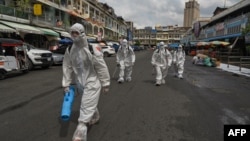Two senior health experts have warned that Cambodia is at a critical juncture where a further deterioration of the COVID-19 situation could lead to mass transmission and the overburdening of Cambodia’s already-fragile healthcare system.
The health experts’ comments come as Cambodia has reported an average of 952 cases a day and 26 deaths since June 28. The scale – both in spread and intensity – of Cambodia’s outbreak has been hard to assess because the Ministry of Health stopped providing provincial case counts since early May and only a few provincial administrations reveal their case numbers.
Dr. Li Ailan, the World Health Organization’s representative to Cambodia, tweeted over the weekend that Cambodia’s COVID-19 situation was getting worse.
“Cambodia is headed toward large-scale community transmission [and] overwhelmed hospital critical care capacity unless all individual [and] social measures are being implemented urgently, responsibly [and] effectively now,” Li wrote on social media last Saturday.
The WHO official said Cambodian authorities should take actions to limit travel and to temporarily close all crowded places, close-contact settings, and confined and enclosed spaces to cut the line of transmission.
“The weekly average cases [and] deaths are still increasing. The existing measures are not sufficient [and] new interventions are needed,” she said.
The government had introduced a three-color zone system in parts of the country in April and early May, with each zone having increasing levels of restrictions. The red zones – mostly in Phnom Penh and with little movement allowed – were dismally managed by the government with residents complaining of food shortages and lack of income to support families.
Or Vandine, a Health Ministry secretary of state, also took to Twitter on Saturday to issue a dire warning about the rising number of COVID-19 cases.
“We are worrying about passing the red line if people [are] still relaxing preventive measures. We must act responsibly together now to revert the situation,” she wrote on Twitter.
“A large-scale community transmission is in front of us now if less action [is taken] by individual & family, and NPIs [non-pharmaceutical interventions] implementations.”
The Health Ministry spokesperson previously told state-run TVK on July 1 that the Alpha strain, first detected in the United Kingdom, was the dominant COVID-19 variant found among patients during the current outbreak.
Authorities have also found cases with the Delta variant of the virus – first detected in India – in imported cases of Cambodian workers returning from Thailand, but local officials and the WHO have said that the highly contagious variant is not circulating among the community.
The spike in cases comes as Phnom Penh health officials announced that more than 99 percent of the capital’s adult population, around 1.7 million residents, were fully vaccinated. The vaccination drive used Chinese-made Sinovac and Sinopharm vaccines and a much smaller quantity of the Indian-made AstraZeneca vaccine.
As of Monday, 4,996,723 people received at least one dose of COVID-19 vaccines – nearly halfway of the government’s target to inoculate 10 million adults, with 1,710,079 people receiving Sinopharm jabs, 165,608 had AstraZeneca shots, and 3,121,036 were vaccinated using Sinovac.
Last week, the government indicated that it was considering giving residents a third dose but has yet to reveal if it will use Sinovac and Sinopharm for the booster shot.
The two vaccines – which have been approved by the WHO in recent months – have had their efficacies come into question, especially with the emergence of more transmissible and lethal varitants of the novel coronavirus. The United Arab Emirates is giving its residents a third dose of the Sinopharm vaccine, whereas Bahrain and Turkey followed their two-shot regimen with a booster of the U.S.-made Pfizer-BioNTech.
Yok Sambath, another Health Ministry secretary of state, told reporters at Phnom Penh International Airport on Saturday, on the sidelines of receiving more vaccines from China, that state health experts were conducting studies on the vaccines’ effectiveness.
“Regarding the effectiveness of the vaccines, like I previously stated, they can protect us from heading into severe illness or death. But if we fail to undertake preventive measures … we are easily transmitting [the virus] regardless of receiving two shots,” she said.
The Cambodian Health Ministry has not been transparent about the number of fully vaccinated people that have been reinfected with the disease or if any of these cases resulted in serious symptoms or deaths.
But on Friday, the WHO’s Li Ailan defended the effectiveness of the Sinovac vaccine.
“All the WHO [emergency use listing] vaccines including Sinovac are still effective, especially to prevent severe disease, reduce hospitalization and deaths. However, no vaccine is 100% protective to date. We know that some people still got infected even after they have been fully vaccinated with #COVID-19,” she told VOA Khmer.
“Meanwhile it is essential to monitor and learn more about new variants and vaccines efficacy. WHO recommends Cambodia to continue its vaccines rollout as quickly as possible. Cambodia is progressing well towards its vaccines rollout goal and targets.”
As the number of active cases creeps up since mid-May, the Health Ministry officially introduced stay-home treatment regimens on Monday for asymptomatic patients. With healthcare facilities strained for beds and resources, officials have had to create makeshift treatment facilities, including one at an abandoned hotel and wedding venues in Phnom Penh.
Health Ministry Secretary of State Ngov Kang said between 75 to 80 percent of the patients are asymptomatic, and Ngy Meanheng, who heads Phnom Penh’s Department of Health, said some 1,033 patients had been receiving treatments at home in the capital.
Additional reporting by Sun Narin.




